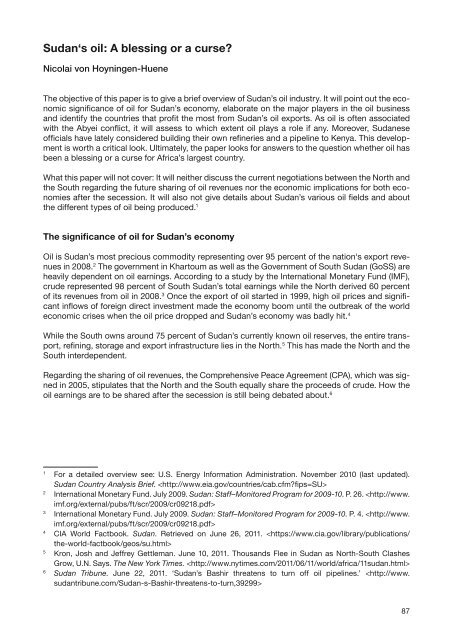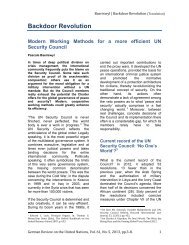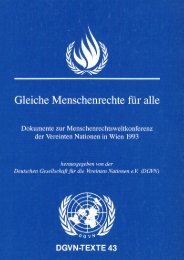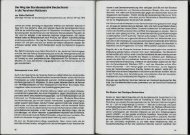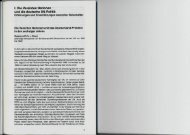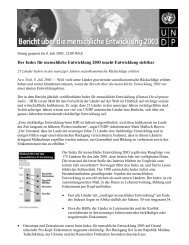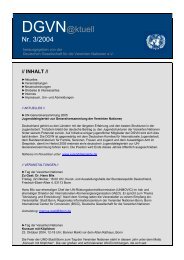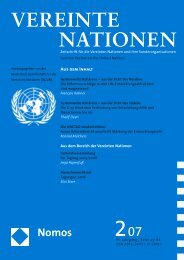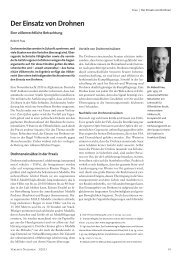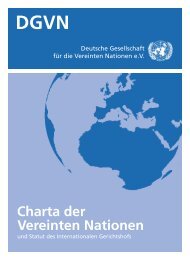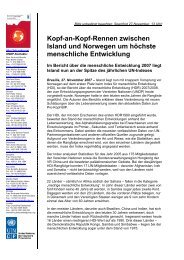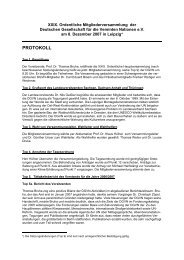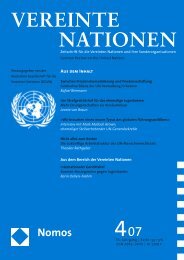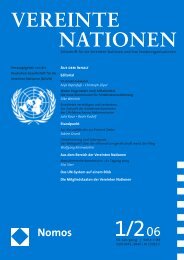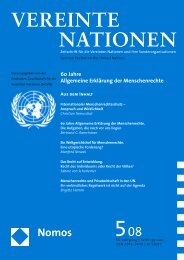Blaue Reihe - Deutsche Gesellschaft für die Vereinten Nationen eV
Blaue Reihe - Deutsche Gesellschaft für die Vereinten Nationen eV
Blaue Reihe - Deutsche Gesellschaft für die Vereinten Nationen eV
Sie wollen auch ein ePaper? Erhöhen Sie die Reichweite Ihrer Titel.
YUMPU macht aus Druck-PDFs automatisch weboptimierte ePaper, die Google liebt.
Sudan‘s oil: A blessing or a curse?<br />
Nicolai von Hoyningen-Huene<br />
The objective of this paper is to give a brief overview of Sudan’s oil industry. It will point out the economic<br />
significance of oil for Sudan’s economy, elaborate on the major players in the oil business<br />
and identify the countries that profit the most from Sudan’s oil exports. As oil is often associated<br />
with the Abyei conflict, it will assess to which extent oil plays a role if any. Moreover, Sudanese<br />
officials have lately considered building their own refineries and a pipeline to Kenya. This development<br />
is worth a critical look. Ultimately, the paper looks for answers to the question whether oil has<br />
been a blessing or a curse for Africa’s largest country.<br />
What this paper will not cover: It will neither discuss the current negotiations between the North and<br />
the South regarding the future sharing of oil revenues nor the economic implications for both economies<br />
after the secession. It will also not give details about Sudan’s various oil fields and about<br />
the different types of oil being produced. 1<br />
The significance of oil for Sudan’s economy<br />
Oil is Sudan’s most precious commodity representing over 95 percent of the nation‘s export revenues<br />
in 2008. 2 The government in Khartoum as well as the Government of South Sudan (GoSS) are<br />
heavily dependent on oil earnings. According to a study by the International Monetary Fund (IMF),<br />
crude represented 98 percent of South Sudan’s total earnings while the North derived 60 percent<br />
of its revenues from oil in 2008. 3 Once the export of oil started in 1999, high oil prices and significant<br />
inflows of foreign direct investment made the economy boom until the outbreak of the world<br />
economic crises when the oil price dropped and Sudan’s economy was badly hit. 4<br />
While the South owns around 75 percent of Sudan’s currently known oil reserves, the entire transport,<br />
refining, storage and export infrastructure lies in the North. 5 This has made the North and the<br />
South interdependent.<br />
Regarding the sharing of oil revenues, the Comprehensive Peace Agreement (CPA), which was signed<br />
in 2005, stipulates that the North and the South equally share the proceeds of crude. How the<br />
oil earnings are to be shared after the secession is still being debated about. 6<br />
1 For a detailed overview see: U.S. Energy Information Administration. November 2010 (last updated).<br />
Sudan Country Analysis Brief. <br />
2 International Monetary Fund. July 2009. Sudan: Staff–Monitored Program for 2009-10. P. 26. <br />
3 International Monetary Fund. July 2009. Sudan: Staff–Monitored Program for 2009-10. P. 4. <br />
4 CIA World Factbook. Sudan. Retrieved on June 26, 2011. <br />
5 Kron, Josh and Jeffrey Gettleman. June 10, 2011. Thousands Flee in Sudan as North-South Clashes<br />
Grow, U.N. Says. The New York Times. <br />
6 Sudan Tribune. June 22, 2011. ‘Sudan’s Bashir threatens to turn off oil pipelines.’ <br />
87


